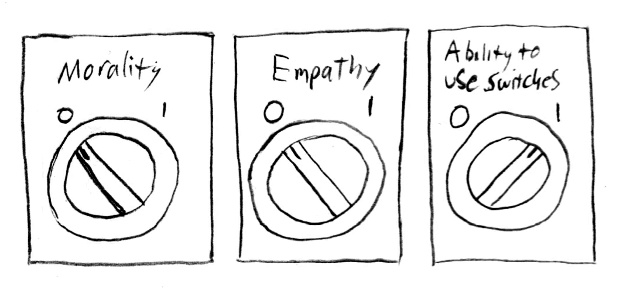Circuits, activate!

I remember watching some sci-fi show years ago with a sentient robot character who always said things like "entering sadness mode" or "activating my joy circuits". Of course, that's totally ridiculous. First of all, what the hell is a joy circuit? Secondly, the idea that a sentient robot would turn on or off their emotions at will is just a cheap grab at otherness to make sure we know that sentient robots can't be like us. The real world obviously wouldn't work like that.
But schlocky sci-fi may have had the last laugh, because not only is a neural circuit a real thing, but it seems like turning on and off certain patterns of thought may also be real (though, thankfully, the two aren't the same). I had a really interesting conversation with a friend in games research a while back who was saying that an important aspect of morality in games is whether the games make you feel like you're making moral decisions. You could be an incredibly moral person but still press a button that murders millions of virtual people without even considering morality, because that's not a moral situation.
That's not a moral situation! What a strange thought. Surely all situations are moral situations if morality is to have any meaning, but there's a certain uncomfortable truth to the idea that we would just forget to think about morality. It's C.S. Lewis's evil of quiet men in well-lit rooms. I doubt most people acting immorally would identify their actions as such, and not even because of some twisted appeal to moral relativism. It's just that the situation never seemed like a moral one in the first place.
And I don't think it's just morality. For example, everyone has the capacity to introspect, to analyse their situation and their decisions and change them for the better. But often we just... don't. Not because we decided that introspection was a bad idea, just because it never came up. Later on it seems so obvious, like, how did I not realise I was doing the wrong thing? But of course it's much easier to engage your introspection circuits in hindsight, much harder to do it at the time.
Every situation is an opportunity for introspection, morality, or emotion; the situation doesn't care what category you put it in, it's just a matter of which lenses you're willing to look at it through. I think we'd be a lot better off if we could distinguish ourselves from our shiny metallic cousins and activate those circuits more often.